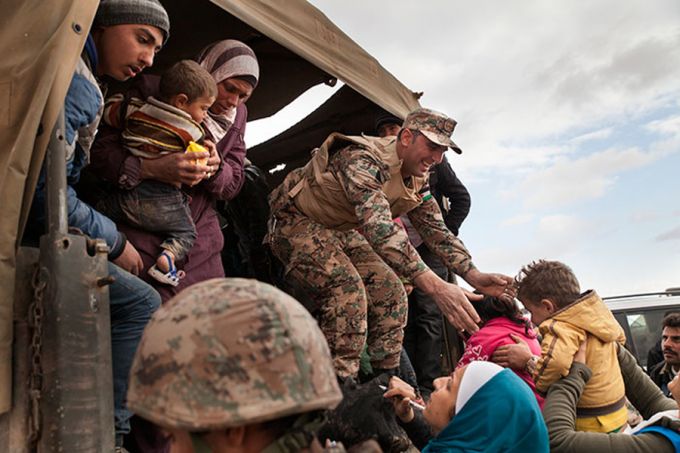– As the number of displaced persons is at its highest worldwide, Catholics must remember that “extremely vulnerable” refugees often flee circumstances where their very lives are at risk, a bishop has said.
“People often forget that the Holy Family themselves were refugees fleeing into Egypt,” Bishop Eusebio Elizondo Almaguer, auxiliary bishop of Seattle, said in a Dec. 30 statement in advance of National Migration Week, which is observed Jan. 3-9.
“Likewise, refugees around the world, all of whom are extremely vulnerable, are fleeing for their lives,” added the chair of the U.S. bishops’ committee on migration. “As Catholics, we are called to welcome and support these families who also need our help.”
The theme of National Migration Week 2016 is “A Stranger and You Welcomed Me.” It focuses especially on the Syrian refugee crisis, where more than 4.1 million have fled the country since 2011 due to an ongoing civil war among rebel factions and the Assad regime.
To observe the week and raise awareness about the plights of migrants, the migration committee has provided prayer resources, including Mass intentions for migrants and civil leaders, and prayers to St. Juan Diego and St. Josephine Bakhita, a Sudanese-born nun who was sold into slavery as a young girl.
Some of the committee’s policy recommendations for the Syrian crisis include the U.S. sending development aid to surrounding countries that are overwhelmed by the number of refugees, and increasing the annual intake of Syrian refugees by preparing to accept 100,000 every year.
The number of persons displaced is at the highest ever recorded – 59.5 million at the end of 2014, according to the United Nations’ refugee agency, UNHCR. It has seen its largest jump in a single year, up from 51.2 million displaced in 2013 and 37.5 million a decade prior. Conflict in Syria is the biggest cause of the increase in migration, the UNHCR claimed in its 2014 Global Trends Report: World at War.
Half of the refugees were children, and only 126,800 returned to their home countries in 2014, the report added.
Ultimately, Catholics must focus on addressing the root causes of migration to best treat the global problem, said Bill O’Keefe, vice president of government relations and advocacy with Catholic Relief Services, in an interview with CNA on International Migrants Day.
“We all need to be focusing on the root causes of migration, and what are the factors that drive people to make what, in this case, is an incredibly dangerous voyage to seek safety and security and opportunity for their families,” he told CNA.
O’Keefe had just returned from a trip to Greece, Macedonia, and Serbia to oversee CRS’ work there helping refugees and migrants from Africa and the Middle East coming to Europe. He said he saw 5,000 a day passing through Macedonia and Serbia, tired after their “long and exhausting trip already.”
“It just felt like a river of humanity looking for a place to find peace and security,” O’Keefe said.
Refugees and migrants are “people like us,” he insisted, “people who are looking for a better life for their kids, who are interested in education and in a job and in safety.”
They would rather not leave their home for another country, but are compelled to do so by their present circumstances, he added. Many fleeing Syria were part of the economic middle-class there before the civil war, but they saw the situation deteriorate over the years – witnessing appalling acts of violence – and eventually had no choice but to leave.
Many migrants from Central America to the U.S. in recent years have had to make the same decision, he pointed out, fleeing “exclusion, and social inequality, and violence.”
O’Keefe praised one example of action taken to address the root causes of migration – the omnibus spending bill passed by Congress Dec. 18. The bill more than doubled funding for education and youth engagement programs in Central America which help youth at risk of gang violence and recruitment, which are chief causes of child emigration in the region. This was a “great step,” he said.
Also, he said the effects of climate change are already increasing migration worldwide, with longer droughts and unusual weather patterns hurting crop yields. This forces some to move elsewhere for employment or away from food scarcity.
Scarcity of vital resources such as water can even further social unrest and conflict, he added.
CRS has helped about 800,000 refugees from Iraq and Syria, O’Keefe noted, and is providing food, water, and clothing to refugees passing through the “transit countries” of Greece, Serbia, and Macedonia on their way to northern Europe. In Iraq, they are building on to incomplete shelters to provide cheap housing for refugees there.
Ultimately, treating migration is not about handing out to materials to crowds, but encountering persons.
“The Holy Father, when he was here, reminded us when he spoke to the Congress that the refugees and migrants are not just numbers, but are people and faces,” O’Keefe said.
Source: CNA






